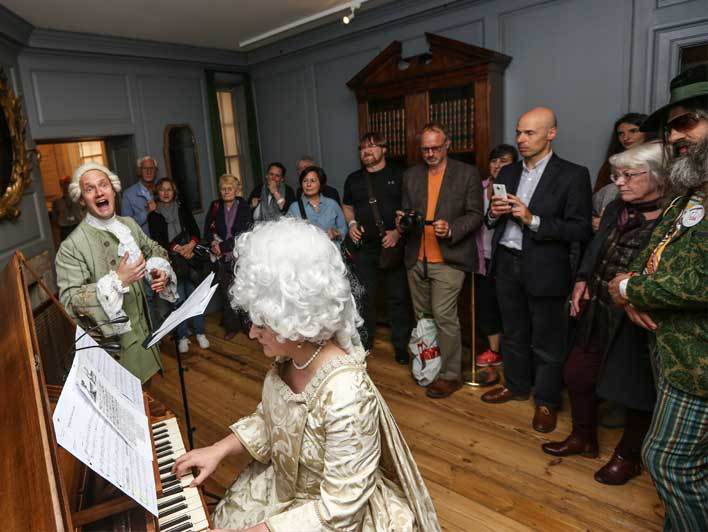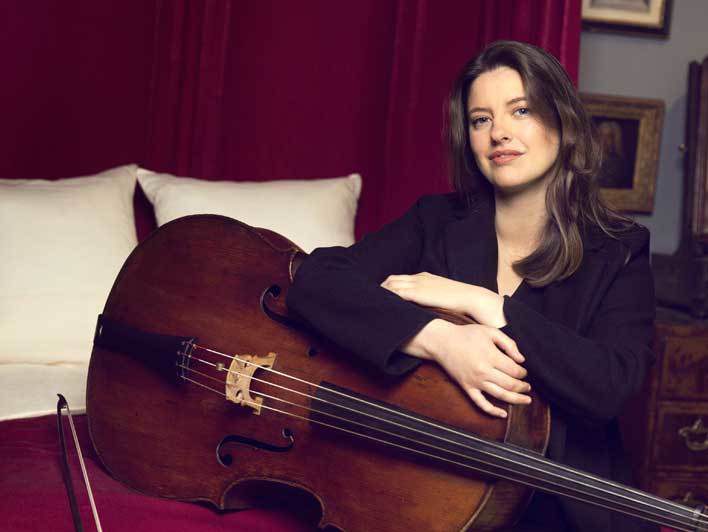SOSARME, RE DI MEDIA (HWV 30)
Libretto: Unknown, after Antonio Salvi
First performance: 15th February 1732, King's Theatre, London
Cast
- Francesco Bernardi, called "Senesino" (Alto-castrato)
- Giovanni Battista Pinacci (Tenor)
- Anna Maria Strada del Pò (Soprano)
- Anna Bagnolesi (Contralto)
- Antonio Gualandi, called "Campioli" (Alto-castrato)
- Francesca Bertolli (Contralto)
- Antonio Montagnana (bass)

Synopsis
Argone, son and heir to Haliate, King of Lydia, has rebelled against his father, believing Haliate to favour his illegitimate son Melo. Haliate has taken up arms against Argone’s forces, who are now under siege in the city of Sardis, where they control of the royal palace. Within the palace are Argone’s mother, queen Erenice, and his sister Elmira. Elmira is promised in marriage to Sosarme, King of Media. Sosarme has come with his army to Sardis to help resolve the dispute between father and son, as it has been decreed that his marriage to Elmira cannot take place whilst Haliate and Argone are at war with each other.
Act I
Within the walls of Sardis, Argone addresses his army. The citizens of Sardis are starving. They are aware the besieging army outside the walls have adequate provisions. Argone determines to launch an attack on his father’s camp in an attempt to relieve the siege.
Inside the palace, Argone’s Erenice tells Argone’s sister Elmira of a dream in which the goddess Hecate appeared to her and promised an end to the war, but that peace would come as the result of the shedding of royal blood – either that of her son (Argone) or that of her husband (Haliate). Elmira takes heart at this ambiguous message but is then distressed to learn the news that Argone is preparing a sortie from the city to attack their father’s forces. Erenice resolves to stop him, either with tearful pleas or, if necessary, with her life.
In the encampment outside the city Haliate’s trusted adviser Altomaro encourages Melo – who is his own grandson as well as being Haliate’s illegitimate son – to profit from the current discord and promote himself as Haliate’s heir. Melo nobly scorns the suggestion as treacherous. Sosarme tells Melo that he is ready to enter the city and negotiate with Argone; if this fails, he will at least have the chance to see his beloved Elmira. Melo wishes his enterprise well.
Before going to see Argone, Sosarme has an interview with Haliate in which he suggests to the king that he (Sosarme) should help Haliate sue for peace with his errant son (Argone). Haliate dismisses this approach, curses the fate that unites his own family and friends against him, and emphasises his determination to punish Argone.
In the city, Argone prepares for the assault on his father’s besieging forces, but is stopped by Erenice and Elmira, who plead with him not to hurt his father. His resolve starts to weaken, but a sudden shout from his army rouses him to action and he leaves for battle. Erenice is distraught, expecting to lose either her husband or her son; Elmira prays to Hecate that the prediction may prove untrue.

Act II
From the battlements Elmira watches as Argone’s forces leave Sardis to be met at the gate by Sosarme’s army; but dust and smoke obscure the fighting. Now she waits in the palace apprehensively for news of the outcome. Triumphant music signals Argone’s victory and Erenice fears that her son has killed his father, her husband. Argone enters, a bloody sword in his hand. He explains that the blood is Sosarme’s – at which Elmira collapses, and Erenice, in anger and distress, refuses to listen further.
In his encampment Haliate accuses Melo of refusing to support his cause, but Melo protests that his greatest wish is to preserve the honour of his king and suggests that Haliate might best punish Argone by offering him a pardon. Haliate reluctantly agrees. He offers to approach and asks Altomaro to go to Argone as his envoy with terms of peace. Alone with Melo, Altomaro accuses him of throwing away his chance of the throne, but Melo steadfastly refuses to act dishonourably. Whilst agreeing to act as Haliate’s envoy, Altomaro secretly forms a plan to put Melo on the throne and thus further his own cause.
Sosarme is recovering from his wounds in the palace, tended by Elmira. They are grateful that misfortune has brought them closer together. Heralds carrying a flag of truce from Haliate are seen approaching the palace and Erenice asks Sosarme to plead with Argone to accept the peace offered by his father. Sosarme agrees to this approach, after all it was for this reason that he allowed himself to be injured and taken prisoner.
Argone agrees to be reconciled provided Haliate names him as his rightful heir. Altomaro is brought in, but his astonishing message is that Haliate regrets the injuries to both armies and now proposes to resolve the dispute in single combat with Argone. Argone angrily accepts the challenge and storms out. Erenice resolves to go and plead with her husband Haliate to stop this madness, while Sosarme goes to Argone in attempt to talk him out of the duel. Sosarme promises Elmira that they will soon enjoy their love in peace. Elmira hopes that the combined efforts of her mother and her lover will restore peace to her family.

Act III
In the camp outside Sardis, Haliate waits for his son’s response. Affecting great distress, Altomaro now reports that Argone has rejected his father’s terms. Continuing his deceitful plan, Altomaro reports that Argone demands that the dispute be resolved by single combat between father and son. Erenice is seen approaching, and Altomaro tells Haliate that she is behind the plan. When Erenice arrives Haliate angrily refuses her a hearing and has her arrested. Melo sees through Altomaro’s deceit and determines to outwit him by taking Haliate’s place in the forthcoming duel. Meanwhile he places Erenice under guard in his own quarters, where she waits in despair.
Argone has found a secret route out of the city to his father’s camp. Sosarme and Elmira attempt to reason with him, but he leaves in a fury. Sosarme determines to follow and prevent the duel. Elmira momentarily despairs but gathers her resolve to follow and do her best to avert imminent disaster.
On the field set aside for the duel, Haliate waits with Altomaro, who fuels his anger against his son. Melo attempts, but fails, to persuade Haliate to let him fight in his stead. Argone presents himself; he and Haliate take up swords and, encouraged by Altomaro, the duel begins. Almost at once Erenice and Melo rush forward to intervene and both are wounded, Erenice by Argone and Melo by Haliate. The men throw down their weapons in horror, while Altomaro, realising that his plot is about to be revealed, slips away unnoticed.
Haliate learns that both he and Argone have been betrayed by Altomaro. Sosarme arrives, and reports that Altomaro has confessed and has committed suicide. Argone and Haliate are reconciled, and Sosarme and Elmira reaffirm their love. The final chorus celebrates the end of discord and the restoration of peace.
Sosarme was first performed at the King’s Theatre on 15th February 1732. Handel had completed the score only two weeks beforehand. The original cast included the great Handel castrato Senesino (Sosarme), the soprano Anna Strada del Pò (Elmira) and the bass (Antonio Montagnana). The initial run was eleven performances and, even though it was a moderate success with critics and audiences, Handel only revived the opera once, in April 1734, for three poorly-attended performances. The first modern revival of Sosarme was by Unicorn Opera at Abingdon in 1970. Since that time, the opera has had a few productions.
Handel and his anonymous librettist adapted the opera from Antonio Salvi’s opera Dionisio, Re di Portogallo (1707) which Handel may have seen performed when he toured Italy. Set in Portugal, the new opera was initially given the title of Fernando, Re di Castiglia. After completing two-thirds of the opera Handel changed the title, location and most of the characters’ names. He also used the change as an excuse to revise elements of Acts I and II. The reasons for this change are unknown, but Winton Dean suggests they may have been political. Britain regarded Portugal as one of its oldest allies and a libretto in which the King is engaged in a civil war with his son might have caused problems at the court of George II, at the time a leading supporter of Handel.
Whilst the libretto (especially the story-line) are poor the same cannot be said for the music, which displays a variety of styles (melody, rhythm, harmony etc.) which is at least the equal of any other of Handel’s operas and is frequently better than them. An example of this appears in the lovers’ duet in the final scene where Elmira is accompanied by violins and Sosarme by ‘four violas in unison’, an unusual combination for Handel. Handel became increasingly experimental in the compositional elements of subsequent operas.
Kindly written and researched by Laurence Slater.


